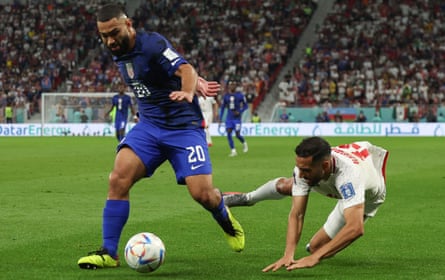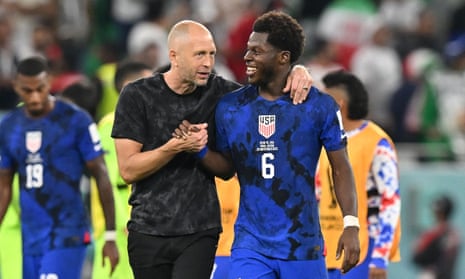Gregg Berhalter knows all about the magnified importance of fine margins in the World Cup. As a US defender he was denied an equalizer in the quarter-finals of the 2002 World Cup when a handball on the line by Germany’s Torsten Frings went unpenalized. The US lost 1-0.
If Iran had shown more composure in the box on Tuesday they might have pinched the point they needed to finish above the US, and instead of looking forward to a round-of-16 tie against the Netherlands on Saturday the American head coach would have faced an uncertain future.
But tallies of heart-in-mouth moments, total time spent watching through fingers and length of bitten fingernails aren’t statistics that count in the official standings, so what matters is that the US finished second in Group B behind England. Right where their talent level suggested they should be.
As a result, Berhalter’s almost certainly earned some long-term job security. Barring a change to standard practice, as co-hosts the US will not brush up against the potential tripwire of a Concacaf qualifying campaign, so he’s likely still to be in charge for the 2026 tournament, when many of the fast-improving current team should be at their peak.
Fairly or not, this, Berhalter’s 59th match in charge, was a referendum on his entire tenure. And he won. Faster, stronger, smarter and more skillful than their opponents, a program on a perpetual quest for respect, a nation that didn’t even qualify for the finals four years ago, is in the World Cup’s last 16.
It’s what the US expected and what the coach needed; risky business, being in charge of the most talented group of footballers your country has ever produced. Finishing below Wales and Iran would not have been a good look.
They’ve achieved the minimum while enacting Berhalter’s grand vision: youth, energy and a high-pressing possession-based style that, without too much suspension of disbelief, could make you believe you’re watching one of the better sides in the world.
Sure, it’s fitful and some faults are still obvious, most notably the lack of goalscoring threat at striker. This is a team of purple patches and gray areas. Injuries to Christian Pulisic and Josh Sargent and Weston McKennie’s fitness are concerns ahead of the clash with the Netherlands, though even at full strength the US would be underdogs. Some of Berhalter’s substitutions are puzzling.
But if we’re going to play “what if?” from the Iranian perspective, we can do it from the American view, too: what if Tim Weah’s knee hadn’t been offside as he ran clear and finished with aplomb at the end of the first half? The second period would have been far more tranquil with the two-goal advantage that was the least the Americans’ superiority merited.
After an offbeat build-up featuring a Gio Reyna conspiracy theory, a social media stunt and questions about his influence on US foreign policy, it barely registered on the weird-o-meter that Berhalter dropped Walker Zimmerman, a trusted starter at center-back for more than a year, in favor of the far less experienced Cameron Carter-Vickers.

With his job on the line, against a nation with the oldest roster in Qatar, and without a win in his past five matches, Berhalter – boss of the second-youngest squad in the tournament – picked his youngest line-up of the three group games.
No one is accusing the coach of hidebound loyalty to “his guys” any longer; it turns out that he is willing to mix-and-match his players as well as his sneakers. The switch, coming after Zimmerman played well in a hugely creditable goalless draw with England, was another example of the ruthless streak Berhalter demonstrated by culling goalkeeper Zack Steffen and forward Ricardo Pepi when he named his 26-man tournament roster.
after newsletter promotion
The risk of pairing Carter-Vickers with Tim Ream for the first time paid off. Both impressed – the physical 24-year-old and the bearded veteran with the appearance of a lumberjack and the anticipation of a chess grandmaster.
Up front, Sargent, restored to the starting XI, was a valuable, busy contributor until injury struck – albeit mainly with his back to goal. When the time came to shelter from the storm late on, Berhalter brought on Shaq Moore, a right-back who hardly featured during Concacaf qualifying, rather than DeAndre Yedlin, the only player on the roster with World Cup experience from a prior finals. That was a gamble that paid fewer dividends.
The overall pattern of play was similar to the Americans’ opening game against Wales: first-half dominance yielding only one goal, making for an anxious second period as cautious and limited opponents left their bunker in search of an equalizer. The difference here was that the US did not make a decisive error.
Quick GuideQatar: beyond the football
Show

It was a World Cup like no other. For the last 12 years the Guardian has been reporting on the issues surrounding Qatar 2022, from corruption and human rights abuses to the treatment of migrant workers and discriminatory laws. The best of our journalism is gathered on our dedicated Qatar: Beyond the Football home page for those who want to go deeper into the issues beyond the pitch.
Guardian reporting goes far beyond what happens on the pitch. Support our investigative journalism today.
Still, US goalkeeper Matt Turner did not need to make a save until the last 10 minutes, and the team showed it could cope without its talisman after the goalscorer, Pulisic, went off injured at the break.
Entering the tournament Berhalter needed to resolve personnel issues, such as who to play at striker and center-back. But the key question was more fundamental, and perhaps substantially beyond his control: would pressure make this band of World Cup novices shrivel or grow? Now we know.
As another high-profile American manager put it: “That’s a big game, man… They did it, God love ‘em.” Berhalter, much doubted and debated, has earned the right not to be second-guessed – at least until the weekend.

Comments (…)
Sign in or create your Guardian account to join the discussion